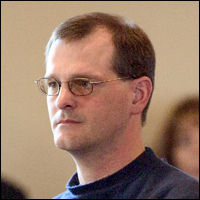By Amanda Lehmert
Cape Cod Times
October 7, 2006
http://www.capecodonline.com/cctimes/nolinto7.htm
Boston - Nearly three years after Jonathan Wessner's battered body was found under a pile of rocks on a Falmouth beach, his killer's lawyer argued for a new trial before the state's highest court yesterday.
Paul Nolin Jr., 42, was convicted by a Barnstable County jury in 2004 of first-degree murder for stabbing and beating Wessner. He was sentenced to life in prison.
In Massachusetts, murder convictions are automatically appealed.
 |
|
Paul Nolin, Jr. Serving a life sentence for killing Jonathan Wessner. Photo by Matt Suess |
Before the Supreme Judicial Court in Boston yesterday, defense attorney Leslie W. O'Brien argued that the court should grant Nolin a new trial because Superior Court Judge Margaret Hinkle made an error when she gave instructions to the jury. O'Brien also questioned the use of a taped conversation between Nolin and a friend that was admitted into evidence at the trial to show he acted as if he were guilty.
Cape and Islands Assistant District Attorney Julia K. Holler said despite the erroneous instruction, the judge's mistake and the use of the taped conversation were not enough to require a new trial or a reduced charge of second-degree murder.
Wessner's father, Thomas Wessner, attended the hearing on behalf of the family. The court will likely take three to four months to deliver a decision in the case.
Wessner, 20, disappeared in September 2003 after leaving a party with Nolin, who spent much of his life in prison for raping an 11-year-old boy. Wessner and Nolin went to Woods Hole together, where prosecutors said Nolin stabbed Wessner in the skull and later buried him.
Wessner's body was found two weeks later, with fractures on both sides of his face, according to experts who testified at trial.
The event spurred a new scrutiny of the state's sex offender registry, which Nolin easily eluded.
It also brought to light an embezzlement case against a Woods Hole priest, the Rev. Bernard Kelly, whom Nolin sought for comfort after Wessner's death.
Kelly is charged with misusing hundreds of thousands of dollars from two Cape churches. His case is set for trial next month in Barnstable Superior Court.
Yesterday, the attorneys had 30 minutes each to make their arguments and answer questions from the justices.
O'Brien argued that the judge inaccurately defined "intent" in one instruction to the jury, violating Nolin's right to due process under the 14th Amendment, which protects against conviction except by proof "beyond a reasonable doubt."
The justices questioned whether the misstep by the trial judge truly changed the outcome of the jury deliberations.
"If (Nolin) didn't have the intent, that ends it, he is acquitted," Justice Judith Cowin said.
"Whoever committed this crime intended to commit it. (Wessner) was brutalized beyond belief," Justice John Greaney said.
Holler, representing the state, said the judge's charge to the jury, overall, accurately defined the concepts of intent and beyond a reasonable doubt.
O'Brien also argued the prosecution used a taped phone call between the imprisoned Nolin and friend Judith Rudd to show Nolin's actions were "inconsistent with innocence."
In the conversation, Rudd tells Nolin police found Wessner's body. Nolin replies "oh God," then asks when it happened and repeatedly asks for his attorney.
"The fact that he was asking for his attorney cannot be used as an admission of guilt," O'Brien told the justices.
Holler said the phone call was admitted into evidence not because Nolin asked to see his attorney, but to show his reaction.
Amanda Lehmert can be reached at alehmert@capecodonline.com.
Any original material on these pages is copyright © BishopAccountability.org 2004. Reproduce freely with attribution.